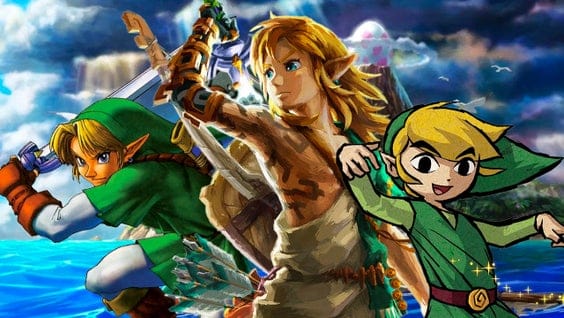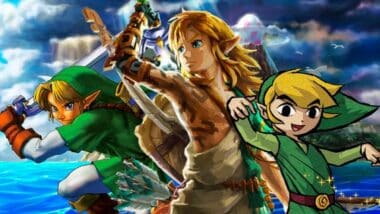The Legend of Zelda series, renowned for its epic quests, captivating narratives, and intricate lore, has captured the hearts of gamers worldwide for decades. Yet, behind the scenes, the series’ producer, Eiji Aonuma, holds a fascinating perspective that diverges from the fan-driven obsession with the franchise’s chronology. Aonuma’s stance on the <b>timeline</b> remains one of nonchalance, emphasizing a creative freedom that prioritizes storytelling and gameplay over a meticulously structured continuity. This unconventional approach has sparked debates and speculation among fans, delving into the lore of the series and challenging the traditional notions of a linear timeline.

The Mythical Disregard: Eiji Aonuma’s Unconcern for the Chronology of the Zelda Series
A Harmonious Juxtaposition: The Disregard for Chronology
Within the gaming community, discussions about the chronological order of Zelda games have been a long-standing point of interest. Fans scrutinize each release, attempting to fit the pieces of the puzzle together, seeking a cohesive timeline that connects the diverse narratives across the games. However, Eiji Aonuma’s perspective on this matter has remained consistently relaxed. He has openly expressed his lack of concern for establishing a definitive chronology, often prioritizing the creation of compelling stories and engaging gameplay mechanics.
Aonuma’s approach reflects a deliberate decision to allow each Zelda game to exist independently, unshackled by the constraints of a rigid timeline. He believes that focusing excessively on a chronological order can potentially hinder the creative process and limit the developers’ freedom to innovate. By treating each game as a standalone experience, Aonuma encourages his team to explore diverse ideas, settings, and gameplay mechanics, fostering a sense of creative liberation that enriches the series.
The Origins: Initial Attempts to Piece Together the Timeline
In the wake of the release of “The Legend of Zelda: Ocarina of Time,” fervent discussions among fans emerged, attempting to connect the dots between different games. This enthusiasm led to the creation of various fan theories and interpretations aiming to establish a comprehensive timeline. Nintendo noticed the fervor surrounding this topic and, in response, provided the “Hyrule Historia,” a book that purportedly laid out the official chronology of the Zelda series. However, even with this release, ambiguities and inconsistencies persisted, leaving ample room for interpretation.
Despite the efforts made in the “Hyrule Historia,” Aonuma refrained from confirming a strict canon timeline, indicating that the team at Nintendo continues to prioritize crafting immersive stories rather than adhering strictly to a predetermined chronology. This deliberate ambiguity has led to an environment where players can enjoy each installment without feeling burdened by the need to piece together an overarching timeline.
Diverging Paths: The Impact on Narrative and Worldbuilding
The absence of a definitive chronology allows the Zelda series to explore diverse narratives and worlds without being constrained by the need for consistency across games. Each title presents a unique adventure, sometimes set in entirely different eras or featuring alternate realities. This approach not only stimulates creativity but also enriches the series by offering players a range of experiences, from the lush landscapes of “The Legend of Zelda: Breath of the Wild” to the darker undertones of “Majora’s Mask.”
Aonuma’s emphasis on a free-form approach to storytelling has enabled the development team to focus on creating rich, immersive worlds rather than adhering to a rigid chronology. This approach fosters an environment where developers can experiment with new ideas, introduce innovative mechanics, and craft narratives that resonate deeply with players, ultimately enhancing the overall experience of the series.
The Continual Speculation: Fan Engagement and Debate
The absence of a concrete timeline has not dissuaded Zelda enthusiasts from engaging in passionate debates and speculation regarding the series’ overarching story. Fans continue to dissect every detail, searching for connections and hidden meanings within the games. The absence of an official timeline only fuels these discussions, leading to a vibrant community that thrives on theorycrafting and sharing interpretations.
Aonuma’s stance has inadvertently fostered a community-driven exploration of the series’ lore. Fans collaborate, share theories, and piece together potential connections, perpetuating the intrigue and mystique surrounding the Zelda universe. While some may seek a definitive timeline, the ongoing debates and speculation have become an integral part of the series’ enduring legacy, fostering a sense of camaraderie among fans.
The Future: A Continuation of Creative Freedom
As the Zelda series continues to evolve, Aonuma’s unwavering stance on the chronology remains a guiding principle for the development team. Embracing the lack of a strict timeline allows for continued innovation and creativity. This approach ensures that each new installment can push boundaries, explore new narratives, and deliver unique experiences without being shackled by the constraints of a predetermined continuity.
In conclusion, Eiji Aonuma’s approach to the Zelda series’ chronology stands as a testament to the prioritization of storytelling and gameplay over the constraints of a linear timeline. His stance encourages creative freedom, allowing each game to exist independently and flourish on its own merits. While debates regarding the series’ chronological order persist among fans, Aonuma’s emphasis on fostering a rich and diverse gaming experience has solidified the Zelda series as a beloved franchise cherished for its captivating adventures and imaginative worlds.


